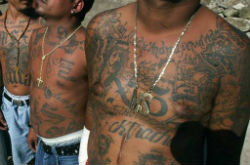El Salvador experienced the most violent month since the country’s civil war in August, which alongside reports of forced displacement by gang members suggest the security situation is increasingly resembling that of a low-intensity war.
On September 1, National Police Director Mauricio Ramirez Landaverde announced there were 907 homicides in El Salvador during the month of August, reported EFE. The number of murders in August is the highest since El Salvador’s civil war ended in 1992, according to the AFP, and more than double the previous month’s murder count.
El Salvador’s Security and Justice Minister, Benito Lara, attributed the spike in homicides during August to “an internal rivalry between gangs and confrontations by criminal groups against the police,” reported La Prensa Grafica. Eugenio Chicas, the Communications Secretary for President Sanchez Ceren, said 85 percent of all homicide victims last month were gang members, according to EFE.
Amid this historic violence, several families have fled their homes in the department of Sonsonate due to threats by the Barrio 18 street gang, reported El Diario de Hoy. Residents told local media that at least 20 families abandoned their homes in the canton of Talcomunca on September 1 after receiving warnings from Barrio 18 that if they didn’t they would be attacked.
InSight Crime Analysis
The record murder count in El Salvador, combined with the reports of forced displacement, paint an increasingly bleak picture of the country’s security landscape.
As noted by Lara, the jump in El Salvador’s murder rate in recent months is likely linked to a growing number of confrontations between gangs and security forces. According to the government, there were over 250 gang attacks on police and the military during just the first four and a half months of 2015. Security officials have responded by ratcheting up the aggression against the street gangs.
SEE ALSO: Coverage of Displacement
While displacement remains difficult to track in El Salvador due to a lack of government resources, reports of families forcibly evicted from their homes by gang members appear to be on the rise. According to a representative of the United Nations High Commissioner for Refugees, gangs and organized crime are the principal driver of forced displacement in the Northern Triangle region (El Salvador, Honduras, Guatemala).
These confrontations and the impact on El Salvador’s civilian population have resulted in a security dynamic that increasingly resembles the type of low-intensity warfare Salvadorans hoped they had left behind two decades ago, but with one critical difference — a lack of political objectives that can be leveraged for a solution to end the violence.

